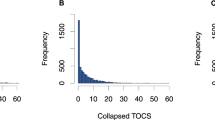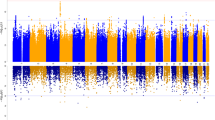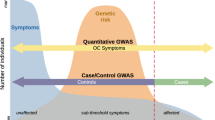Abstract
Positive association between obsessive compulsive disorder (OCD) and the A-allele of the 5-HT2A-receptor promoter polymorphism −1438G/A has recently been reported in adults. We performed an association analysis of this polymorphism in 55 children and adolescents with OCD and in 223 controls consisting of unrelated students. We detected statistically significant differences in genotype (P < 0.05) and allele frequencies (P < 0.05) between individuals with OCD and controls. In this, to our knowledge, first association study based on children and adolescents with OCD, we confirm an association of the A-allele of the 5-HT2A receptor gene with OCD.
This is a preview of subscription content, access via your institution
Access options
Subscribe to this journal
Receive 12 print issues and online access
$259.00 per year
only $21.58 per issue
Buy this article
- Purchase on Springer Link
- Instant access to full article PDF
Prices may be subject to local taxes which are calculated during checkout
Similar content being viewed by others
References
DSM-IV. Diagnostic and Statistical Manual of Mental Disorders, 4th edn APA: Washington DC 1996
Carey G, Gottesmann II . Defining cases by genetic criteria In: Wing JK, Bebbington P, Robins LW (eds) What is Case? Grant McIntyre: London 1981 pp 29–41
Pauls DL, Alsobrook JP, Goodman W, Rasmussen S, Leckman JF . A family study of obsessive-compulsive disorder Am J Psychiatry 1995 152: 76–84
Flament MF, Koby E, Rapoport JL . Childhood obsessive-compulsive disorder. A prospective follow-up study J Child Psycho Psychiatry 1990 31: 363–380
Lesch KP . Psychobiologie der Zwangskrankheit Fortschr Neurol Psychiatr 1991 59: 404–412
Lesch KP, Bengel D, Heils A, Sabol SZ, Greenberg BD, Petri S et al. Association 1996 of anxiety-related traits with a polymorphism in the serotonin transporter gene regulatory region Science 1996 274: 1527–1531
Zohar J, Chopra M, Sasson Y, Aimaz R, Amital D . Obsessive compulsive disorder: serotonin and beyond. Review World J Biol Psychiatry 2000 1: 92–100
Brewerton TD . Toward a unified theory of serotonin dysregulation in eating and related disorders Psychoneuroendocrinology 1995 20: 561–590
Kaye WH . Anorexia nervosa, obsessional behavior, and serotonin Psychopharmacol Bull 1997 33: 335–344
Enoch MA, Kaye WH, Rotondo A, Greenberg BD, Murphy DL, Goldman D . 5-HT2A promoter polymorphism −1438G/A, anorexia nervosa, and obsessive-compulsive disorder Lancet 1998 351: 1785–1786
Jarry JL, Vaccarino FJ . Eating disorder and obsessive-compulsive disorder: neurochemical and phenomenological commonalities J Psychiatry Neurosci 1996 21: 36–47
Hanna GL, Yuwiler A, Cantwell DP . Whole blood serotonin in juvenile obsessive-compulsive disorder Biol Psychiatry 1991 29: 738–744
Zohar J, Insel TR . Obsessive-compulsive disorder. Psychobiological approaches to diagnosis, treatment, and pathophysiology Biol Psychiatry 1987 22: 667–687
Pigott TA, Hill JL, Grady TA, L'Heureux F, Bernstein S, Rubenstein C-S et al. A comparison of the behavioral effects of oral versus intravenous mCPP administration in OCD patients and the effect of metergoline prior to i.v. mCPP Biol Psychiatry 1993 33: 3–14
Arranz MJ, Munro J, Owen MJ, Purlock G, Sham PC, Zhao J et al. Evidence for association between polymorphisms in the promoter and coding regions of the 5-HT2A receptor gene and response to clozapine Mol Psychiatry 1998 3: 61–66
Enoch MA, Goldman D, Barnett R, Sher L, Mazzanti CM, Rosenthal NE . Association between seasonal affective disorder and the 5-HT2A promoter polymorphism 1438G/A Mol Psychiatry 1999 4: 89–92
Nakamura T, Matsushita S, Nishiguchi N, Kimura M, Yoshino A, Higuchi S . Association of a polymorphism of the 5-HT2A receptor gene promoter region with alcohol dependence Mol Psychiatry 1999 4: 85–88
Collier DA, Arranz MJ, Li T, Mupita D, Brown N, Treasure J . Association between the 5-HT2A gene promotor polymorphism and anorexia nervosa Lancet 1997 350: 412
Hinney A, Ziegler A, Nöthen MA, Remschmidt H, Hebebrand J . 5-HT2A receptor gene polymorphism, anorexia nervosa, and obesity Lancet 1997 350: 1324–1325
Campbell DA, Sundarmurthy D, Markham AF, Pieri LF . Lack of association between 5-HT2A gene promotor polymorphism and succeptibility to anorexia nervosa Lancet 1998 351: 499
Aubert R, Betoulle D, Herbeth B, Siest G, Fumeron F . 5-HT2A receptor gene polymorphism is associated with food and alcohol intake in obese people Int J Obes Relat Metab Disord 2000 24: 920–924
Preuss UW, Koller G, Bondy B, Bahlmann M, Soyka M . Impulsive traits and 5-HT2A receptor promoter polymorphism in alcohol dependents: possible association but no influence of personality disorders Neuropsychobiology 2001 43: 186–191
Enoch MA, Greenberg BD, Murphy DL, Goldman D . Sexually dimorphic relationship of a 5-HT2A promoter polymorphism with obsessive-compulsive disorder Biol Psychiatry 2001 49: 385–388
Nicolini H, Cruz C, Camarena B, Orozco B, Kennedy JL, King N et al. DRD2, DRD3 and 5-HT2A receptor genes polymorphisms in obsessive-compulsive disorder Mol Psychiatry 1996 1: 461–465
Frisch A, Michaelovsky E, Rockah R, Amir I, Hermesh H, Laor N et al. Association between obsessive-compulsive disorder and polymorphisms of genes encoding components of the serotonergic and dopaminergic pathways Eur Neuropsychopharmacol 2000 10: 205–209
Spurlock G, Heils A, Holmans P, Williams J, D'Soouza UM, Carno A et al. A family based association study of the T102C polymorphism in 5HT2A and schizophrenia plus identification of new polymorphism in the promoter Mol Psychiatry 1998 3: 42–49
Goodman WK, Price LH, Rasmussen SA, Mazure C, Fleischmann RL, Hill CL et al. The Yale-Brown Obsessive Compulsive Scale I. Development, use, and reliability Arch Gen Psychiatry 1989 46: 1006–1011
Unnewehr S, Schneider S, Margraf J (eds). Kinder-DIPS: Diagnostisches Interview bei psychischen Störungen im Kindes- und Jugendalter Springer: Berlin, Heidelberg, New York 1995
Hinney A, Lentes KU, Rosenkranz K et al. Beta 3-adrenergic-receptor allele distributions in children, adolescents and young adults with obesity, underweight and anorexia nervosa Int J Obes Relat Metab Disord 1997 21: 224–230
World Health Organization. Composite International Diagnostic Interview (CIDI): (a) CIDI Interview version 1.0, (b) CIDI-user manual, (c) CIDI-training manual, (d) CIDI computer programs WHO: Geneva 1990
Acknowledgements
We thank all probands for their participation. The Bundesministerium für Bildung und Forschung (BMBF, 01KW006; 01GS0118) supported the molecular genetic and statistical analyses.
Author information
Authors and Affiliations
Corresponding author
Rights and permissions
About this article
Cite this article
Walitza, S., Wewetzer, C., Warnke, A. et al. 5-HT2A promoter polymorphism −1438G/A in children and adolescents with obsessive-compulsive disorders. Mol Psychiatry 7, 1054–1057 (2002). https://doi.org/10.1038/sj.mp.4001105
Received:
Revised:
Accepted:
Published:
Issue Date:
DOI: https://doi.org/10.1038/sj.mp.4001105
Keywords
This article is cited by
-
High resolution chromosomal microarray analysis in paediatric obsessive-compulsive disorder
BMC Medical Genomics (2017)
-
Molecular genetics of obsessive–compulsive disorder: a comprehensive meta-analysis of genetic association studies
Molecular Psychiatry (2013)
-
Pilot study on HTR2A promoter polymorphism, −1438G/A (rs6311) and a nearby copy number variation showed association with onset and severity in early onset obsessive–compulsive disorder
Journal of Neural Transmission (2012)
-
Genetics of early-onset obsessive–compulsive disorder
European Child & Adolescent Psychiatry (2010)
-
Transmission disequilibrium studies in early onset of obsessive–compulsive disorder for polymorphisms in genes of the dopaminergic system
Journal of Neural Transmission (2008)



